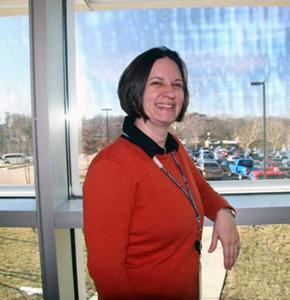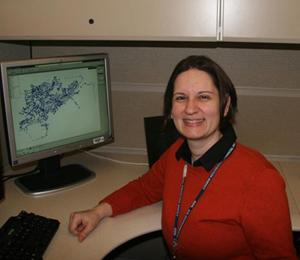Meet EPA Environmental Engineer Terra Haxton, Ph.D.

Protecting Water Security
EPA Environmental Engineer Terra Haxton, Ph.D., uses computer simulation models to support Homeland Security Research to protect drinking water. She investigates approaches to help water utilities be better prepared to respond to contamination incidents in their distribution systems.
In her current research, she is developing the Water Security Toolkit software—a tool that would help water utility personnel and other emergency responders combat potential water contamination events, such as identifying which water hydrants they should open in order to flush contaminated water.
How does your science matter?
Our drinking water can become contaminated as it flows through the distribution system to us. Contamination can occur if: the water infrastructure is old and damaged; a natural disaster occurs like an earthquake or hurricane; or from acts of terrorism. My research uses computer models that simulate these events to help water utilities prevent the contamination risks in our water supply. I use a map of a specific water utility network—the pipes, storage tanks, and other infrastructure that transport drinking water from the source to the tap—combined with a computer program called EPANET to model the flow of water and contaminants in that distribution network.
- EPANET - software that models water distribution piping systems.
My research is designed to help a water utility that has detected a contaminant and wants to figure out the best approach for minimizing public health and economic impacts. The tool will help utilities determine where the contaminant was introduced into the pipes, what hydrants might be best for flushing the contaminant out of the system, or what booster stations might be used to help disinfect a biological contaminant.
We look at a variety of contaminants of concern, from everyday contaminants such as the bacteria E. coli, to chemical or biological agents. Our homeland security research can be applied to a wide range of contaminants so it's really helpful to water utilities.
If you could have dinner with any scientist, past or present, who would you choose and what would you ask them?
I would like to have dinner with Dr. Peter Gleick of the Pacific Institute. I would ask him, "In your opinion, what is the biggest problem facing the U.S. water community today?"

Tell us about your background.
I went to Rose-Hulman Institute of Technology in Indiana where I received a Bachelors of Science degree in Civil Engineering. From there I went to Vanderbilt University in Nashville, Tennessee, where I received a Masters degree and Ph.D. in Environmental Engineering.
How did you get started at EPA?
I knew EPA was doing water security research because I saw several EPA researchers at conferences, while I was working on my Ph.D. I started as a postdoctoral fellow in 2007 and moved into a permanent position a few months later.
What do you like most about your research?
I really like it because we are helping to protect our water, a valuable asset. Most people don't take a lot of time to think about how they get their water, but there is a lot of work that goes into making sure it is clean and reliable and I feel we are helping to do this.
I also really like using computer programming models in my research because I enjoy writing computer code. I have done a little bit of coding on the side for some of the software programs we are developing.
When did you first know you wanted to be an engineer?
In middle school, I really enjoyed my science classes. When I went to college, my mom really encouraged me to pursue engineering because it's a broad field with many opportunities to find something that suits your interests. I thought civil engineering would be the best match for someone who likes the natural and earth sciences.
Environmental protection has always been very important to me, which is why I chose Environmental Engineering for my Ph.D. Working at EPA has always been my career goal, so I'm really happy to be working here!
If you were not an engineer, what would you be doing?
I can't imagine not being a scientist! I have always enjoyed art so I might do something with that.
Any advice for students considering a career in science?
Study hard and try to do well in math and science. Even if you don't become a scientist, having a strong background in math and science is very beneficial.
I would also encourage students to consider engineering. With an engineering background, you can go into almost anything. A lot of people with whom I studied engineering later became doctors and lawyers.
As a scientist there are a lot of fun and exciting things to learn and do. You get the opportunity to try many different things over the course of your career because new challenges are always presented.
